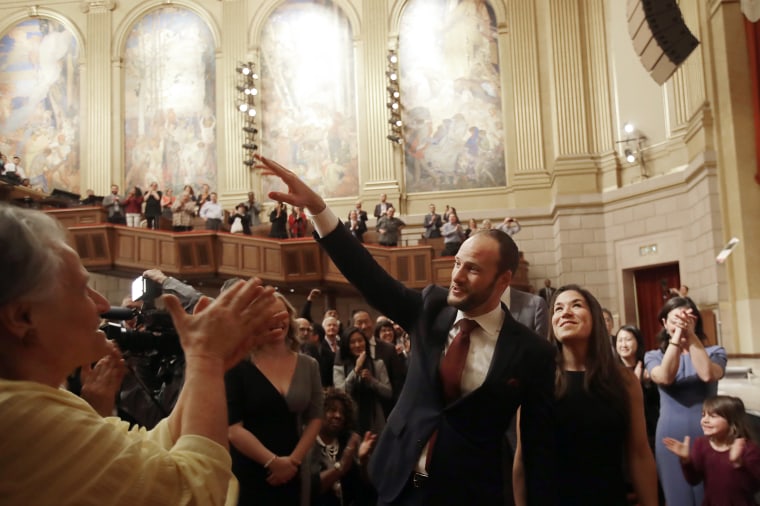Progressive prosecutors, coming off one of the biggest years in their movement's short history, are looking to 2020 with hope of winning key district attorney offices around the nation and boosting their influence with an overhaul of the system from within.
Attorney General William Barr is standing in their way.
Tensions reached a peak last week after Barr eviscerated the movement in a speech before the Major County Sheriffs of America. He said the "self-styled 'social justice' reformers are refusing to enforce entire categories of law, including law against resisting police officers."
"In so doing, these DAs are putting everyone in danger," Barr added, asserting that their "policies are pushing a number of America's cities back toward a more dangerous past."
In a response signed by about 40 reform-minded prosecutors from around in the country, the progressives said they "spend every day trying to make our communities safer and healthier."
"We hold our jobs because our communities put us in them after we promised a different and smarter approach to justice, one grounded in evidence-based policies that lift people up while prioritizing the cases that cause real harm," they wrote. "Sadly, we are perceived as a threat by some who are wedded to the status quo or, even worse, failed policies of past decades."
They added: "This is the same attorney general who in the span of 24 hours attacked reform-minded, elected district attorneys for being soft on crime, while demanding his own federal prosecutors lighten the punishment for an ally of his boss. He touts the importance of the rule of law, yet undermines it in the same breath."
The attack and counterattack come as progressives' have seen their influence soar over the past few years, winning district attorney races in cities like San Francisco, Philadelphia and Chicago and enacting or furthering policies such as eliminating the use of cash bail — which has become a major flashpoint in New York — overturning wrongful convictions, curbing enforcement of lower-level marijuana offenses, refusing to cooperate with federal immigration authorities and vowing to hold police accountable.
The most prominent among them — and the one who has faced the most law enforcement pushback — is hard-charging Philadelphia County District Attorney Larry Krasner, whose 2017 election was a watershed moment for the criminal justice reform movement.
Download the NBC News app for breaking news and politics
Krasner has instructed his team to avoid prosecutions "where appropriate" to lower the incarcerated population, opting instead for a more liberal use of diversion programs. He fired 31 prosecutors at the start of his term for their unwillingness to implement his changes, and he put 29 Philadelphia police officers on a "do-not-call list" — meaning they could not be considered credible witnesses at trials.
Especially notable was Chesa Boudin's victory last year in San Francisco's district attorney race. Boudin, a Rhodes Scholar whose parents took part in one of New York's most notorious and deadly botched heists as members of the far left Weather Underground in 1981, pledged to end "mass incarceration" and cash bail while forming a unit to review wrongful convictions. Boudin, who took office last month, plans to move away from prosecuting minor quality-of-life crimes and instead focus on taking on corporations and prioritizing the most serious offenses.
And progressives have their sights set on some big targets this year — like electing reformers in Los Angeles, Houston and Detroit, as well as State's Attorney Kim Foxx's re-election effort in Cook County, Illinois, an election that will test the popularity of the liberal policies.
The Justice Department and other law enforcement entities have characterized many of the changes as anti-police and threats to public safety.
Tensions have been "escalating" in recent months, the head of the nation's largest police organization told NBC News.
"The path that we're going is not addressing the core issues that are creating poverty and crime in our communities," said Patrick Yoes, president of the Fraternal Order of Police. "There has to be a more holistic approach to it rather than trying to blame law enforcement for everything."
Barr last month announced the formation of a presidential commission on law enforcement — one that will focus in part on combating the reformers and provide Barr with recommendations in a report that is likely to come just before the November general election.
"Sadly, this commission appears to be designed to further false narratives around crime that stoke community fear in an attempt to resurrect failed 'tough on crime' approaches of past decades that fueled mass incarceration and disproportionately impacted communities of color," Miriam Krinsky, executive director of the nonprofit group Fair and Just Prosecution, told NBC News.
Krinsky called it a "thinly veiled attempt by some wedded to the status quo to undermine new criminal justice thinking grounded in data and built on the recognition that the U.S. is an international outlier in its rate of incarceration."

Those efforts come as President Donald Trump has made his record on criminal justice reform a facet of his re-election effort, touting passage of criminal justice legislation known as the First Step Act and launching a Super Bowl ad featuring Alice Johnson, a black woman sentenced to life in prison for a nonviolent drug offense whose sentence he commuted in 2018.
The progressives "really do have the potential to set both a new narrative, but really a new experience for a large number of people," said Rashad Robinson, a spokesperson for Color Of Change PAC, a political action committee focused on racial justice.”
The pushback from Barr and other top law enforcement officials shows "how much power this movement has built over the last several years and how much progress we've made," Robinson added. "It also shows how much of a threat we are to the status quo."

